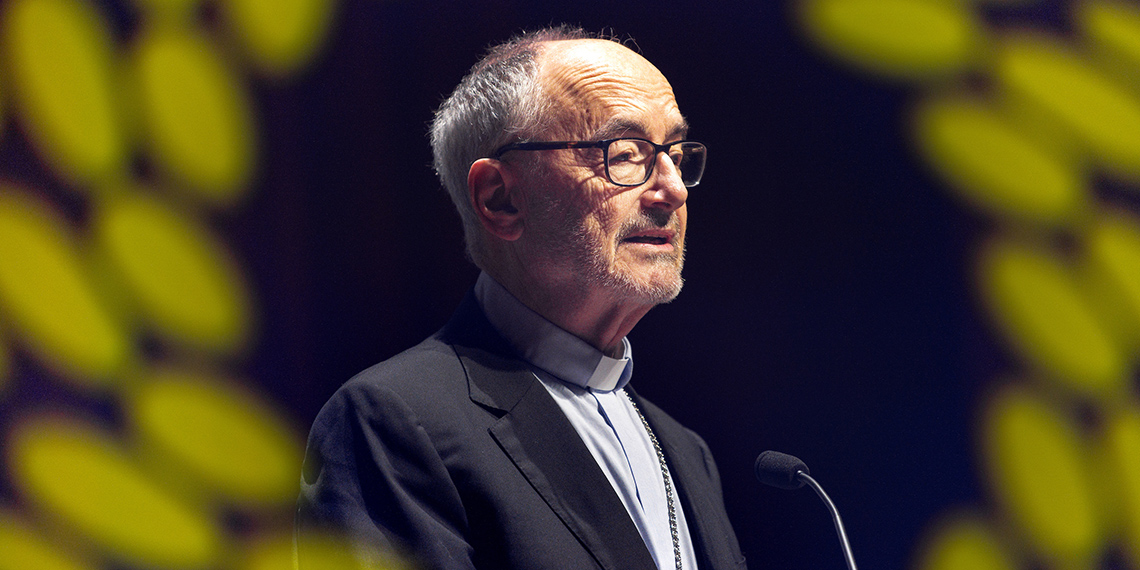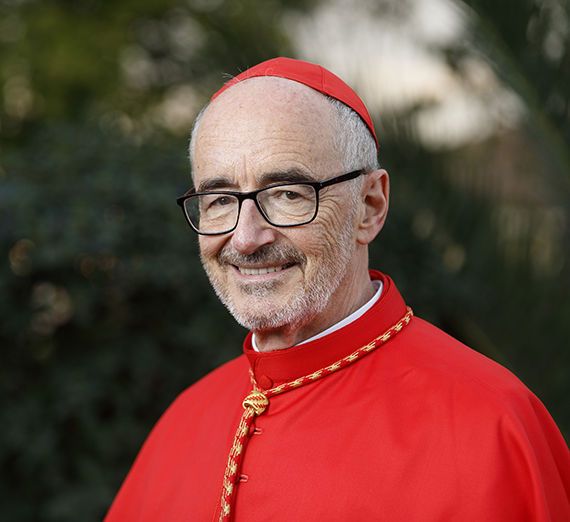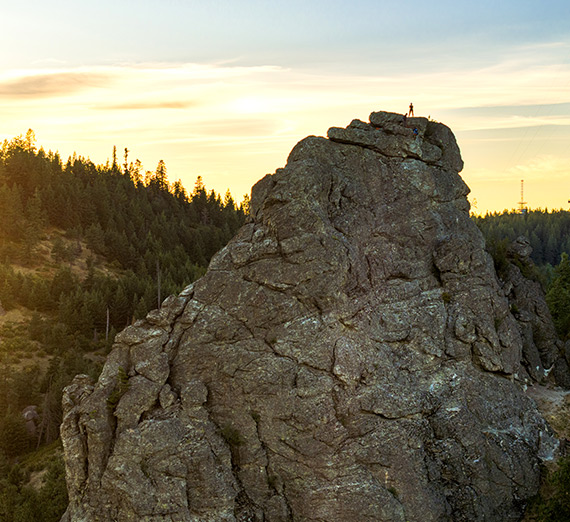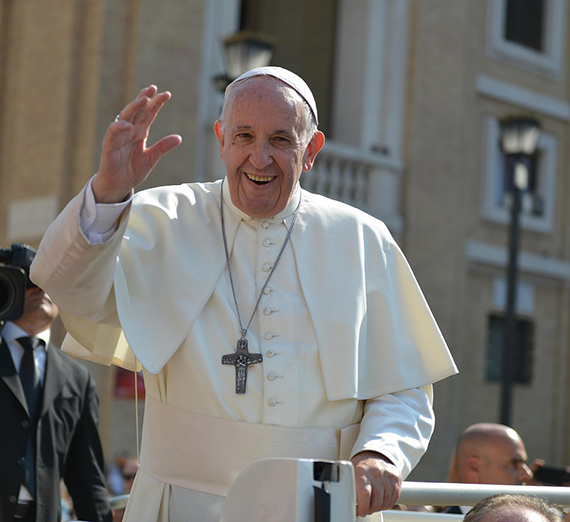Cardinal Michael Czerny, S.J., Offers Keys to Addressing Climate Crisis

In an hour-long talk laced with humor, practical advice and inspiration for addressing the climate crisis, Cardinal Michael Czerny, S.J. (‘68) emphasized Pope Francis’ challenge that caring for the planet will take all its residents’ best efforts.
Czerny, whose official title is “Prefect of the Vatican Dicastery for Promoting Integral Human Development,” is the Catholic Church’s leader in efforts to become better caretakers of the planet. He traveled from Rome to Spokane to challenge the Gonzaga University community to lead and take action in pursuit of the “care for our common home” outlined in Pope Francis’ “Laudato si” encyclical. Nearly 700 people attended the sold-out event at the Myrtle Woldson Performing Arts Center sponsored by the Center for Climate, Society and the Environment, the Office of Mission Integration and the Jesuit community.
After short introductions by Climate Center Director Brian Henning and GU President Thayne McCulloh, Czerny recalled how, during his years at Gonzaga, words like “ecology” and “environmentalism” were not yet a common part of the country’s conversations. But the Vietnam War — and specifically the use of napalm to make the terrain of the Viet Cong uninhabitable — was “an early if terrible lesson in the interconnectedness between human and environmental destruction, instead of human and environmental sustainability.”
Back then, American colleges and universities were at the forefront of protesting the horrific destruction done by napalm and warfare in Southeast Asia, Czerny said, and college students were in the streets calling for a better world. One significant result of that activism, he added, was the creation of Earth Day in 1970, which brought together an estimated 20 million people across the U.S., including at schools and universities, in unity to protect the planet.
“What I remember is that the driving force behind those epochal events was mainly universities,” Czerny said. “It was our generation, the famous 1968 generation of young people!”
Fast-forward to September 2019 and global climate protests that took place in 150 different countries. But this time, he noted, the activism wasn’t led by university students or faculty members, but by school children and teenagers.
“Where were the universities? I leave that question for you to ponder and respond,” Czerny said.
Czerny recommended two texts to help his audience join that transformation, both of them encyclicals from Pope Francis, “Laudato si” and “Fratelli tutti.” Their messages were entwined and simplified by the cardinal to “what needs doing, and who’s to do it?” Both messages, Czerny noted, were addressed to the entire world, not just the Catholic Church.
“Laudato si” is focused on the planet’s ecological crisis. But it’s not just about how our common home is crumbling around us, Czerny said, but about the “millions of our brothers and sisters” in underdeveloped nations suffering from the droughts, the storms, the cataclysmic climate events that are happening more and more often due to the heavy industrialization of more developed countries.
“Those who have contributed least to causing the crisis in the first place are usually its early and disproportionate victims,” Czerny said. “’Laudato si’ is, in fact, more of a social encyclical than one on climate change. As an attentive reader pointed out, ‘climate’ is mentioned just 14 times in the text, while ‘the poor,’ 59 times.”
Pope Francis’ “Fratelli tutti” message focuses on “our interrelated and interdependent” existence.
“If ‘Laudato si’ reminds us that Earth is our common home and our shared inheritance, ‘Fratelli tutti’ tells us that we are all members of a single family,” Czerny said.
That responsibility means acting as “neighbors without borders,” he added, and recognizing we must all care for our Indigenous neighbors in the Amazon being pushed from their homelands by mining and agribusiness interests. We must care for our neighbors in Sub-Saharan Africa where drought forces people to flee in search of sustenance, and our neighbors coming across the borders of the U.S. as living conditions in their own countries are becoming increasingly unlivable.
Jesus, Czerny said, wants us to know that any differences between us in origin, race, language, religion, orientation, political affiliation are “all irrelevant when asking, ‘Who is my neighbor? Who is my sibling?’”
“Unless we get beyond tribalism, we won’t be able to offer our poor, beaten-up, half-dead world the first aid it needs more and more each day,” Czerny said. “The alternative — not to care, to blame the system, to blame the victims — is to fall into despair.”
Fortunately, we have the ability to make a difference, Czerny said, something Pope Francis reminds us in “Laudato si.” We can dialogue with our neighbors, and we can demand better politics and more equitable economies. We can rebuild “the shattered bonds of fraternity” by engaging with our global neighbors, and we can reverse the damages of industrialization and the ravages of profit-at-any-cost economies on our planet.
“We need to speak more of eco-justice today, especially in our universities,” Czerny said. “Eco-justice is primarily about concern for the poor and vulnerable members of our common household. Eco-justice demands that the right to development of the poor and the question of poverty alleviation be placed at the heart of a true moral response to the crisis of our common home.”
Czerny recognized that his Spokane alma mater was one of the first universities to sign on to the “Laudato si Action Platform,” and challenged the Gonzaga community to join the work, whether on campus or in the community, as an individual or as a family, and to help lead the way to the serious dialogue and better brand of politics that are, Czerny said, “the only way out” of the climate crisis.
“May Gonzaga University become a shining example in the network of ‘Laudato si’ universities around the world that aim to form good believers, good citizens, and good stewards who care for our common home,” Czerny said.
You can watch a recording of Cardinal Czerny’s address at gonzaga.edu/cardinal. And you can read a digital version of a book, “Our Common Home: A Guide to Caring for Our Living Planet,” that was given to all attendees at Czerny’s campus talk.
- Alumni
- Faith & Mission
- Global Impact
- Sustainability
- Institute for Climate, Water, and the Environment
- Division of Mission Integration
- News Center




